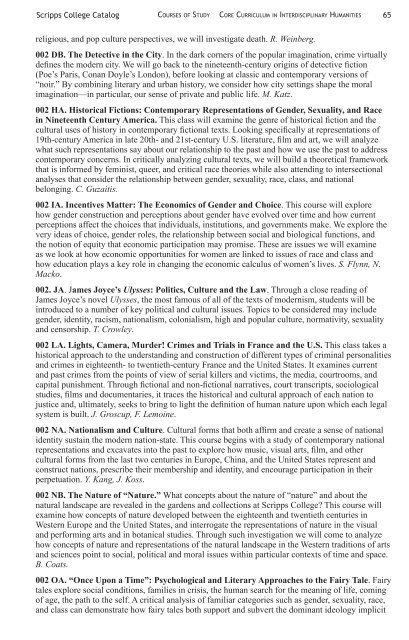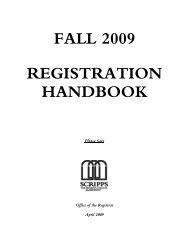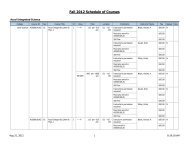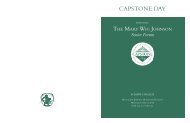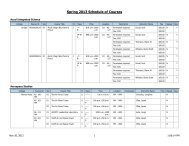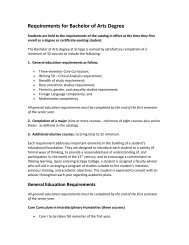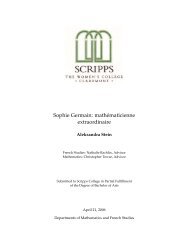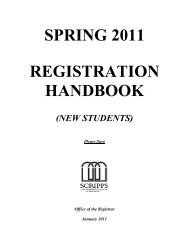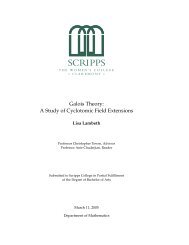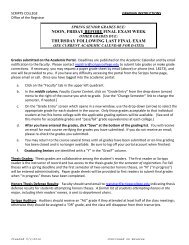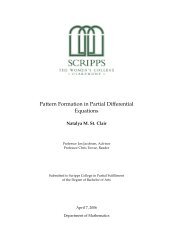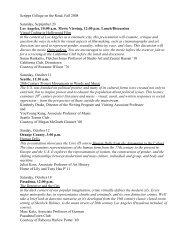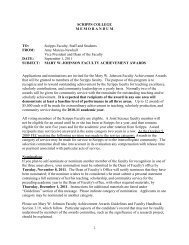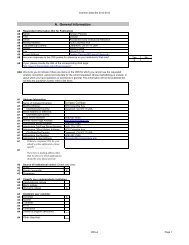PDF of the 2012-2013 Academic Catalog - Scripps College
PDF of the 2012-2013 Academic Catalog - Scripps College
PDF of the 2012-2013 Academic Catalog - Scripps College
Create successful ePaper yourself
Turn your PDF publications into a flip-book with our unique Google optimized e-Paper software.
<strong>Scripps</strong> <strong>College</strong> <strong>Catalog</strong><br />
Courses <strong>of</strong> Study<br />
Core Curriculum in Interdisciplinary Humanities<br />
65<br />
religious, and pop culture perspectives, we will investigate death. R. Weinberg.<br />
002 DB. The Detective in <strong>the</strong> City. In <strong>the</strong> dark corners <strong>of</strong> <strong>the</strong> popular imagination, crime virtually<br />
defines <strong>the</strong> modern city. We will go back to <strong>the</strong> nineteenth-century origins <strong>of</strong> detective fiction<br />
(Poe’s Paris, Conan Doyle’s London), before looking at classic and contemporary versions <strong>of</strong><br />
“noir.” By combining literary and urban history, we consider how city settings shape <strong>the</strong> moral<br />
imagination—in particular, our sense <strong>of</strong> private and public life. M. Katz.<br />
002 HA. Historical Fictions: Contemporary Representations <strong>of</strong> Gender, Sexuality, and Race<br />
in Nineteenth Century America. This class will examine <strong>the</strong> genre <strong>of</strong> historical fiction and <strong>the</strong><br />
cultural uses <strong>of</strong> history in contemporary fictional texts. Looking specifically at representations <strong>of</strong><br />
19th-century America in late 20th- and 21st-century U.S. literature, film and art, we will analyze<br />
what such representations say about our relationship to <strong>the</strong> past and how we use <strong>the</strong> past to address<br />
contemporary concerns. In critically analyzing cultural texts, we will build a <strong>the</strong>oretical framework<br />
that is informed by feminist, queer, and critical race <strong>the</strong>ories while also attending to intersectional<br />
analyses that consider <strong>the</strong> relationship between gender, sexuality, race, class, and national<br />
belonging. C. Guzaitis.<br />
002 IA. Incentives Matter: The Economics <strong>of</strong> Gender and Choice. This course will explore<br />
how gender construction and perceptions about gender have evolved over time and how current<br />
perceptions affect <strong>the</strong> choices that individuals, institutions, and governments make. We explore <strong>the</strong><br />
very ideas <strong>of</strong> choice, gender roles, <strong>the</strong> relationship between social and biological functions, and<br />
<strong>the</strong> notion <strong>of</strong> equity that economic participation may promise. These are issues we will examine<br />
as we look at how economic opportunities for women are linked to issues <strong>of</strong> race and class and<br />
how education plays a key role in changing <strong>the</strong> economic calculus <strong>of</strong> women’s lives. S. Flynn, N.<br />
Macko.<br />
002. JA. James Joyce’s Ulysses: Politics, Culture and <strong>the</strong> Law. Through a close reading <strong>of</strong><br />
James Joyce’s novel Ulysses, <strong>the</strong> most famous <strong>of</strong> all <strong>of</strong> <strong>the</strong> texts <strong>of</strong> modernism, students will be<br />
introduced to a number <strong>of</strong> key political and cultural issues. Topics to be considered may include<br />
gender, identity, racism, nationalism, colonialism, high and popular culture, normativity, sexuality<br />
and censorship. T. Crowley.<br />
002 LA. Lights, Camera, Murder! Crimes and Trials in France and <strong>the</strong> U.S. This class takes a<br />
historical approach to <strong>the</strong> understanding and construction <strong>of</strong> different types <strong>of</strong> criminal personalities<br />
and crimes in eighteenth- to twentieth-century France and <strong>the</strong> United States. It examines current<br />
and past crimes from <strong>the</strong> points <strong>of</strong> view <strong>of</strong> serial killers and victims, <strong>the</strong> media, courtrooms, and<br />
capital punishment. Through fictional and non-fictional narratives, court transcripts, sociological<br />
studies, films and documentaries, it traces <strong>the</strong> historical and cultural approach <strong>of</strong> each nation to<br />
justice and, ultimately, seeks to bring to light <strong>the</strong> definition <strong>of</strong> human nature upon which each legal<br />
system is built. J. Groscup, F. Lemoine.<br />
002 NA. Nationalism and Culture. Cultural forms that both affirm and create a sense <strong>of</strong> national<br />
identity sustain <strong>the</strong> modern nation-state. This course begins with a study <strong>of</strong> contemporary national<br />
representations and excavates into <strong>the</strong> past to explore how music, visual arts, film, and o<strong>the</strong>r<br />
cultural forms from <strong>the</strong> last two centuries in Europe, China, and <strong>the</strong> United States represent and<br />
construct nations, prescribe <strong>the</strong>ir membership and identity, and encourage participation in <strong>the</strong>ir<br />
perpetuation. Y. Kang, J. Koss.<br />
002 NB. The Nature <strong>of</strong> “Nature.” What concepts about <strong>the</strong> nature <strong>of</strong> “nature” and about <strong>the</strong><br />
natural landscape are revealed in <strong>the</strong> gardens and collections at <strong>Scripps</strong> <strong>College</strong>? This course will<br />
examine how concepts <strong>of</strong> nature developed between <strong>the</strong> eighteenth and twentieth centuries in<br />
Western Europe and <strong>the</strong> United States, and interrogate <strong>the</strong> representations <strong>of</strong> nature in <strong>the</strong> visual<br />
and performing arts and in botanical studies. Through such investigation we will come to analyze<br />
how concepts <strong>of</strong> nature and representations <strong>of</strong> <strong>the</strong> natural landscape in <strong>the</strong> Western traditions <strong>of</strong> arts<br />
and sciences point to social, political and moral issues within particular contexts <strong>of</strong> time and space.<br />
B. Coats.<br />
002 OA. “Once Upon a Time”: Psychological and Literary Approaches to <strong>the</strong> Fairy Tale. Fairy<br />
tales explore social conditions, families in crisis, <strong>the</strong> human search for <strong>the</strong> meaning <strong>of</strong> life, coming<br />
<strong>of</strong> age, <strong>the</strong> path to <strong>the</strong> self. A critical analysis <strong>of</strong> familiar categories such as gender, sexuality, race,<br />
and class can demonstrate how fairy tales both support and subvert <strong>the</strong> dominant ideology implicit


